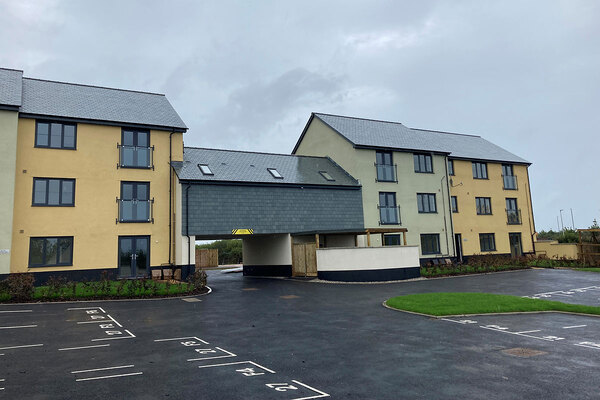You are viewing 1 of your 1 free articles

Brexit remains unpredictable, so governance is key for landlords
Brexit paralysis continues to spark plenty of uncertainty, not least for housing associations. Effective governance is the best protection though, writes Michael Cameron
Landlords are having to deal with a lot of uncertainty. No more so than on the UK leaving the European Union, with the continuing doubt about if and when withdrawal will happen and what leaving with or without a deal might bring.
In February we wrote to all registered social landlords (RSLs) to underline the importance of complying with regulatory standards in the context of the uncertainty around the withdrawal from the EU.
We restated how important it is for landlords to manage resources to ensure financial well-being and to base financial forecasts on appropriate and reasonable assumptions.
There’s no doubt that it is now more difficult to anticipate the future, and so assumptions that were once considered appropriate and reasonable may have to be revisited.
We referred landlords to the Bank of England’s range of scenarios on the possible impact on key economic variables of withdrawal from the European Union.
Some of these are based on key variables, such as the rate of inflation and interest rates, being much more volatile than they have been in the recent past.
And, of course, individual landlords are the best judge of their own circumstances. So they will be aware of other factors that they may have to address in the context of withdrawal from the EU, for example, the availability of labour and access to materials and components.
The aggregate financial position of RSLs in Scotland remains strong. There’s no evidence of systemic problems in financial health.
Scottish landlords do not have the same exposures to market risks that some of their colleagues in England face.
So, in terms of finance at least, Scottish landlords may be well placed to manage some of the risks that could come from a withdrawal from the European Union.
However, the range of risks that will accompany such a withdrawal are unpredictable and will undoubtedly challenge landlords. A strong financial position can certainly help to mitigate risk, but we know how quickly such a position can change.
A well-run and well-governed landlord will be best-placed to manage the risks and challenges that will come its way, including those from a withdrawal from the European Union. This is about a landlord understanding its business and understanding the scenarios that will put its business under stress. It will know the risks that threaten its stability, including the terms of its lending agreements that may be most at risk. It will test all of its decisions robustly.
“The range of risks that will accompany such a withdrawal are unpredictable and will undoubtedly challenge landlords”
It will stay close to its lenders. And it will look to create the capacity, financial and organisational, to get it through uncertain times.
So the best protection for a landlord in volatile times is effective governance.
I’m reminded of an article I read some years ago – and well before leaving the EU was in the mainstream – about the sustained success of over 800 years of some of the Oxbridge colleges.
Those colleges are some of the most successful institutions in the world and are among the biggest landowners in the UK. The author of the article argued that they have achieved and sustained this success by staying true to its principles, taking the long view, growing when they can and waiting when they can’t.
No matter what your view is of such institutions, there may be lessons for our sector in such a culture.
The new regulatory framework for Scottish social landlords went live last month. The new framework promotes a culture of assurance. This is designed to help board and committee members of landlords get the assurance they need that their organisation is well run and delivers good outcomes for tenants, people who are homeless and others who use their services.
We have introduced a requirement for all landlords to make an annual assurance statement.
This is a way for landlords to assure first themselves and then their tenants and service users that they comply with regulatory requirements and are meeting all of their legal duties, including on tenant and resident safety.
Within this, it will be important for board and committee members to get and give assurance about how their organisation is responding to the challenges and risks they face, including those around withdrawal from the European Union.
We’ll provide support to landlords in the lead up to the submission of the first annual assurance statement, and we will continue to be alert to the risks that come from uncertainty.
Michael Cameron, chief executive, Scottish Housing Regulator










